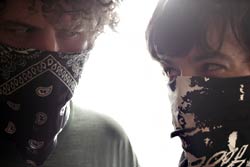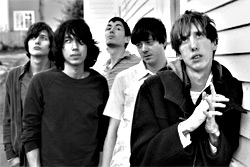- Tibetan Buddhist rites from the monasteries of Bhutan, “Invitation to Padma Sambhava” (Sub Rosa; originally released 1971).
- Peter Garland, “Coyote’s Bones (Last Piece), Part Two” (Tzadik).
- Goldmund, “Parhelia” (Type).
- Lula Côrtes y Zé Ramalho, “Omm” (Shadoks; originally released 1975).
- Judee Sill, “The Living End” (Water).
- Sweet Inspirations, “Every Day Will Be Like a Holiday” (Soul Jazz; originally released 1969).
- Goldmund, “Marching Through Georgia” (Type).
- Stephan Mathieu, “Tinfoil Star” (Headz).
- Lawrence, “Falling Down a Dam of Mashed Potatoes” (Staubgold).
- Ana da Silva, “Friend” (Chicks on Speed Records).
- Gang Gang Dance, “Before My Voice Fails” (The Social Registry).
- Four Tet, “You Were There With Me” (Domino).
- Goldmund, “Larrows of the Field” (Type).
- Satwa, “Apacidonata” (Time-Lag; originally released 1973).
- Judee Sill, “Til Dreams Come True (instrumental)” (Water).
- Giuseppe Ielasi, “Gesine V” (Häpna).
The weather remains stubborn to spring here, so this music is intended for dreamy, if chilly, mornings, when the day feels suspended in solution. I think of regions and rituals displaced or resuscitated, slightly sintered together so as to connect across geographical divides: Tibetan monks exiled to Bhutan, in a ceremony equal parts Sun Ra and Sunn O))); Brooklyn’s Gang Gang Dance, who stake sonic space between Kate Bush’s “Wuthering Heights,” Radio Ethiopia, and the Safe Sex riddim; Four Tet’s Kieran Hebden, who melts down Javanese gamelan gongs till they’re a pool of tones to splash in. German electronic composer Mathieu sort of does this with a viola, accruing its finest frequencies till “Tinfoil Star” coruscates. Peter Garland, an American minimalist composer who researches Oaxacan music, parlays a poem by Jaime de Angulo into a piece for marimba, violin, and piano.
The piano strings it all together, due to Bostonian Keith Kenniff, under his Goldmund moniker. “Parhelia” is a small patch of light, or a mock sun, much like its namesake. The other two are Civil War ballads, played as softly and assuredly as any of Satie’s “Gnossiennes.” Lawrence is as surefooted in the pop ambience he crafted for a disc of children’s music. From the feedback, you might think Italian guitarist Ielasi played a candle flame, his tone quavering with such diffuse luminance.
A region I was completely unfamiliar with until recently was the tropical forests of northeastern Brazil. Two reissues of extremely rare psych-folk center on multi-instrumentalist Lula Côrtes. The alchemical joining of Côrtes to Zé Ramalho (who went on to be a major star of the region) created Paêbirù‘s vertiginous suites to the four elements, of which “Omm” comprises air. Côrtes also played some sitar with guitarist Lailson in an earlier incarnation as Satwa (considered the first independent LP pressed in Brazil). In both duos, the sound is at once spectral, sad, and surreal; it suggests that the Old Weird America is also South American.
Other things that don’t change: Judee Sill back after some 25 years departed, still sitting at the piano, poised between awe-filled rapture and awful pain. And Ana da Silva from the Raincoats, using digital devices to delightfully remain odyshaped. My love of Muscle Shoals soul never abates. Hear how they back Bobby Brown’s future mother-in-law as she belts out the promise: “Every day will be like a holiday.”
Andy Beta is a freelance writer in Brooklyn.






